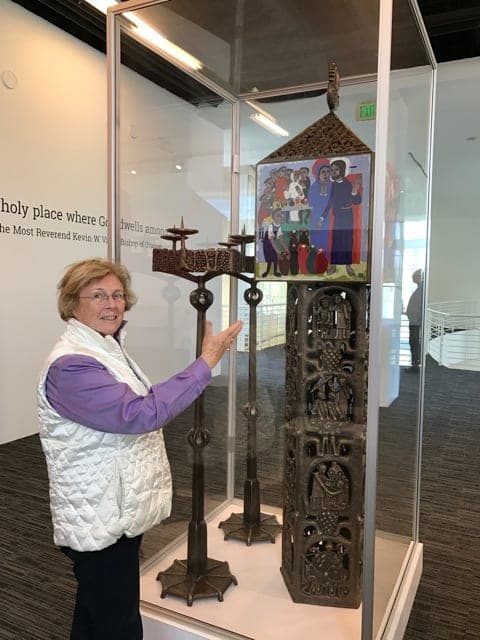DENVER, Colorado – People generally come to Denver for the surplus of good jobs, for access to the mountains, or because it’s one of the fittest cities in the country and they suspect they’ll lose some pounds just by being in thinner air.
Most don’t think of the Mile-High City also as a place to be inspired by, and to purchase, religious art. Maybe they should reconsider, because for the past 30 years, Hildegard Letbetter has run Creator Mundi, a place where someone can procure religious art, as well as learn about the artists from around the world creating it.
Letbetter, originally from Germany, got her start in the business when she found herself looking for a First Communion gift.
“I couldn’t find what I was looking for. There were a lot of (how should I say) items that people were selling and buying …but it wasn’t what I thought the occasion deserved,” she told Crux.
She decided to find something that would be appropriate, and recognizing the dearth in sacred art, began a business in finding beautiful religious art and selling it from her guest house.
She began her quest of finding things in Europe that she could sell, which makes sense both because she was born in Europe, and because countries such as Italy, France and Germany are often more associated with religious art than the U.S. She knew she would pay the artists a fair price, and they wanted to talk about what they were doing.
She looked for art, she said, that “would be really the message of Jesus.”
“I was born in Cologne, and I was familiar with some of the sources …something that would enhance our faith and celebrate our faith,” Letbetter said. “I visited a monastery, Benediktiner Abtei Maria Laach in Germany, and I asked them to send me something and they did. They never sent me an invoice.”
That in itself might have been a kind of spiritual message to continue down the same path. In any event, continue she did.
“Next time I went to Europe I visited other places, and so it grew,” she said.
Even though she found success early on, this was not the career she was originally seeking. She was hoping to teach, having been trained in theology, but sometimes the best laid plans don’t come to fruition no matter how much we would like.
Usually it’s a lack of qualifications that holds one back from a job, but in Letbetter’s case, Arapahoe Community College told her she was “overqualified to teach, but I had a degree in theology from Cologne, so it all came together.”
In a sense, she found another route to teaching. She says that “sacred art and meaningful symbols are my mission.” With that mission along with a shop full of beautiful art she had the opportunity to teach many people who might never have taken a theology class something about faith and religion.
For many years, the Creator Mundi shop was in the heart of Denver’s high-end shopping district Cherry Creek. Letbetter said when they were first there it was a “haven for art and culture.” While shopping for expensive clothes and furniture, people would wander into her shop and see unique pieces they wouldn’t find in other galleries. The art and her inviting personality inspired strangers to react, talk and ask questions.
Letbetter has been called a “spiritual bartender,” because all kinds of people would come in and tell her their story.
She wasn’t one to waste such a golden opportunity to share her knowledge and faith with all comers. She says that many people came into the shop and said ‘what is this?’ giving her the chance to engage and teach them. It also didn’t depend on her presence since, she says, “everybody who worked there had a background in spirituality or theology.”
Letbetter sees clearly the “power art has beyond words.” Just speaking about “Christ and the Adultress,” a famous piece by the German artist Lucas Cranach, she enthuses that “the artist depicts Jesus as holding the woman’s hand. His eyes are all red. The artist wanted to say Jesus had studied the law all night. He had taken the word and wanted to apply it.”
This was the kind of lesson she was able to give numerous clients over the years, she said, about the art they were seeing and purchasing.
Being in a climate like Cherry Creek that over time had morphed into a kind of “Wall Street of Denver” raising the costs of leases for shops astronomically, she concedes that there were days that were “tremendously difficult, but there were also days that people came in and thanked us for being there and said we need you here.”
Eventually the costs were too great, but that didn’t end her mission. Now she continues her ecumenical work from offices and a warehouse in Englewood, a suburb of Denver.
“To teach and to focus, but also to have community,” she said, describing the aims of her efforts. “How do you express welcome? Receiving new members into their community. Within the Christian gallery, we all need to hold hands. We need to avoid saying, ‘I’m right, you’re wrong.’”
While community is something that feeds her passion, she said her business succeeds ultimately because, “We’re known for exceptional pieces of art. They’re costly because they’re handmade … it will be a piece for centuries.”
“It’s nothing you would find in a catalogue,” she said. “It’s not mass-produced.”
These words describe more than the art, but Letbetter’s entire approach to her business – and, for that matter, to faith and to life.
















